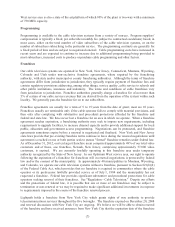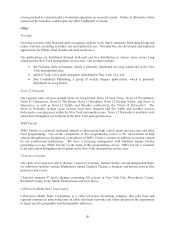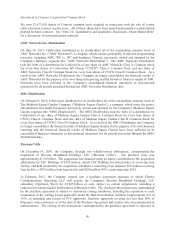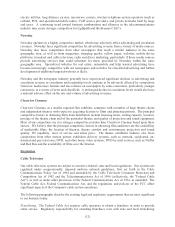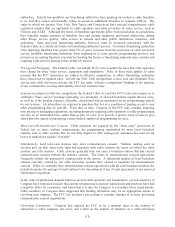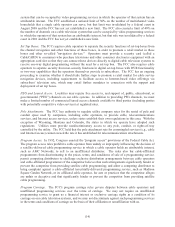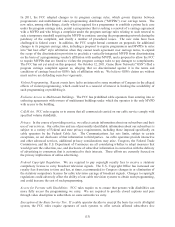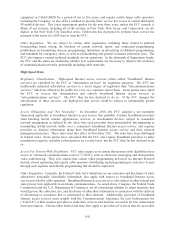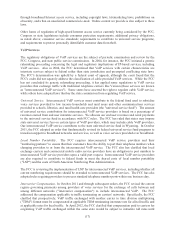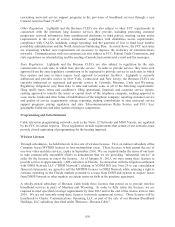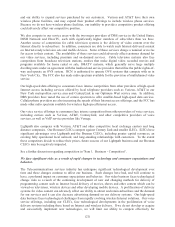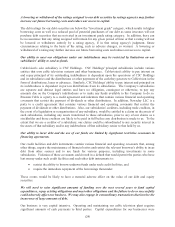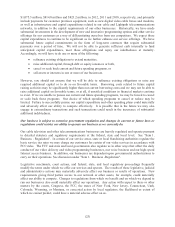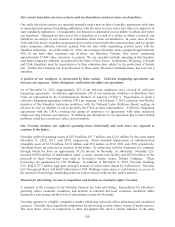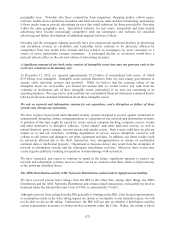Cablevision 2012 Annual Report Download - page 23
Download and view the complete annual report
Please find page 23 of the 2012 Cablevision annual report below. You can navigate through the pages in the report by either clicking on the pages listed below, or by using the keyword search tool below to find specific information within the annual report.(17)
through broadband Internet access service, including copyright laws, telemarketing laws, prohibitions on
obscenity, and a ban on unsolicited commercial e-mail. Online content we provide is also subject to these
laws.
Other forms of regulation of high-speed Internet access service currently being considered by the FCC,
Congress or state legislatures include consumer protection requirements; additional privacy obligations,
as noted above; consumer service standards; requirements to contribute to universal service programs;
and requirements to protect personally identifiable customer data from theft.
VoIP Services
The regulatory obligations of VoIP services are the subject of periodic examination and review by the
FCC, Congress, and state public service commissions. In 2004, for instance, the FCC initiated a generic
rulemaking proceeding concerning the legal and regulatory implications of IP-based services, including
VoIP services. Also in 2004, the FCC determined that VoIP services with certain characteristics are
interstate services subject to federal rather than state jurisdiction and preempted conflicting state laws.
The FCC's determination was upheld by a federal court of appeals, although the court found that the
FCC's order did not squarely address the classification of cable-provided VoIP services. While the FCC
has not concluded its generic rulemaking proceeding, it has applied some regulations to VoIP service
providers that exchange traffic with traditional telephone carriers like Verizon (these services are known
as "interconnected VoIP services"). Some states have asserted the right to regulate cable VoIP service,
while others have adopted laws that bar the state commission from regulating VoIP service.
Universal Service. Interconnected VoIP services must contribute to the federal fund used to subsidize
voice services provided to low income households and rural areas and other communications services
provided to schools, libraries, and rural health care providers (the "universal service fund"). The amount
of universal service contribution for interconnected VoIP service providers is based on a percentage of
revenues earned from end user interstate services. We allocate our end user revenues and remit payments
to the universal service fund in accordance with FCC rules. The FCC has ruled that states may impose
state universal service fees on certain types of VoIP providers, which may include cable VoIP providers.
Our interconnected VoIP service contributes to the state universal service fund in Wyoming. In October
2011, the FCC adopted an order that fundamentally revised its federal universal service fund programs to
transition support to broadband networks and services, as well as voice services provided over broadband.
Local Number Portability. The FCC requires interconnected VoIP service providers and their
"numbering partners" to ensure that their customers have the ability to port their telephone numbers when
changing providers to or from the interconnected VoIP service. The FCC also has clarified that local
exchange carriers and commercial mobile radio service providers have an obligation to port numbers to
interconnected VoIP service providers upon a valid port request. Interconnected VoIP service providers
are also required to contribute to federal funds to meet the shared costs of local number portability
("LNP") and the costs of North American Numbering Plan Administration.
The FCC is reviewing the implementation of LNP for interconnected VoIP services, including whether all
current numbering requirements should be extended to interconnected VoIP services. The FCC has also
adopted rules requiring providers to process standard telephone number ports within one business day.
Intercarrier Compensation. In October 2011 and through subsequent orders, the FCC revised the current
regime governing payments among providers of voice services for the exchange of calls between and
among different networks ("intercarrier compensation") to include interconnected VoIP. The FCC
addressed the compensation applicable to traffic terminating on carriers' networks. Specifically, the FCC
clarified that prospectively, VoIP traffic exchanged with another carrier in time division multiplexing
("TDM") format must be compensated at applicable TDM terminating interstate rate for all toll traffic and
at applicable rates for local traffic. In April 2012, the FCC clarified that compensation paid to carriers for
originating VoIP traffic exchanged within the same state would be subject to intrastate toll rates until


